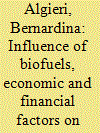|
|
|
Sort Order |
|
|
|
Items / Page
|
|
|
|
|
|
|
| Srl | Item |
| 1 |
ID:
112294


|
|
|
|
|
| Publication |
2012.
|
| Summary/Abstract |
This paper investigates the role of comparative advantage on biofuel policy adoption. Results show that different countries have different drivers to create biofuel policies. GDP proves to be more significant for OECD countries, while arable land and feedstock prices are more significant for non-OECD countries. Land allocation may also be of importance. We speculate that a naturally endowed comparative advantage may not necessarily equate to a successful biofuel industry.
|
|
|
|
|
|
|
|
|
|
|
|
|
|
|
|
| 2 |
ID:
162289


|
|
|
|
|
| Summary/Abstract |
The Brazilian government aims to increase the share of biofuels in the energy mix to around 18% by 2030, which implies an increase of ethanol production from currently 27 bln liters to over 50 bln liters per year. Biofuel policies play an important role in ethanol production, consumption, and investment in processing capacity. Nevertheless, a clear understanding of how current policies affect the evolution of the market is lacking. We developed a spatially-explicit agent-based model to analyze the impact of different blend mandates and taxes levied on gasoline, hydrous, and anhydrous ethanol on investment in processing capacity and on production and consumption of ethanol. The model uses land use projections by the PCRaster Land Use Change model and incorporates the institutions governing the actors’ strategic decision making with regard to production and consumption of ethanol, and the institutions governing the interaction among actors. From the investigated mix of policy measures, we find that an increase of the gasoline tax leads to the highest increased investments in sugarcane processing capacity. We also find that a gasoline tax above 1.23 R$/l and a tax exemption for hydrous ethanol may lead to doubling the production of ethanol by 2030 (relative to 2016).
|
|
|
|
|
|
|
|
|
|
|
|
|
|
|
|
| 3 |
ID:
131365


|
|
|
|
|
| Publication |
2014.
|
| Summary/Abstract |
Despite criticism, global biofuel production continues to rise, using primarily food crops. Between 2001 and 2012 it increased nearly six-fold, driven primarily by domestic policies, yet raising strong international concerns, eg over impacts on global food prices. Nevertheless, little international biofuel governance has emerged. This article examines the various extraterritorial dimensions of domestic biofuel policies and investigates why international biofuel governance has remained vague, despite its controversial nature. It uses the politics of scale to analyse why countries may wish to frame it as a global or domestic issue. Three extraterritorial dimensions are identified: global environmental impacts, global socioeconomic impacts, and attempts at extraterritorial control over biofuel production abroad. While major producers have successfully avoided liability for impacts by preventing the scaling up of much biofuel governance to the international level, major importers have tried to fill perceived governance gaps using policies aimed at extraterritorial control. We show that both the rise of nationally oriented development policies with extraterritorial impacts and of unilateral sustainability rule making primarily affect weaker countries, making global inequalities more pronounced. It is essential that adaptation governance take into account both environmental and global socioeconomic changes, such as higher agricultural commodity prices.
|
|
|
|
|
|
|
|
|
|
|
|
|
|
|
|
| 4 |
ID:
094920


|
|
|
|
|
| Publication |
2010.
|
| Summary/Abstract |
In recent years, there has been a push to increase biofuel production in the United States. The biofuel of choice, so far, has been ethanol produced from corn. The effects of increased corn-ethanol production on the consumer prices of food and energy continue to be studied and debated. This study examines, in particular, the effects of increased corn-ethanol production on US natural gas prices. A structural model of the natural gas market is developed and estimated using two stage least squares. A baseline projection for the period 2007-2018 is determined, and two scenarios are simulated. In the first scenario, current biofuel policies including EISA mandates, tariffs, and tax credits are removed. In the second scenario, we hold ethanol production to the level required only for largely obligatory additive use. The results indicate that the increased level of corn-ethanol production occurring as a result of the current US biofuel policies may lead to natural gas prices that are as much as 0.25% higher, on average, than if no biofuel policies were in place. A similar comparison between the baseline and second scenario indicates natural gas prices could be as much as 0.5% higher, on average, for the same period.
|
|
|
|
|
|
|
|
|
|
|
|
|
|
|
|
| 5 |
ID:
132657


|
|
|
|
|
| Publication |
2014.
|
| Summary/Abstract |
Biofuels production has experienced rapid growth worldwide as one of the several strategies to promote green energy economies. Indeed, climate change mitigation and energy security have been frequent rationales behind biofuel policies, but biofuels production could generate negative impacts, such as additional demand for feedstocks, and therefore for land on which to grow them, with a consequent increase in food commodity prices. In this context, this paper examines the effect of biofuels and other economic and financial factors on daily returns of a group of commodity futures prices using Generalized Autoregressive Conditional Heteroskedasticity (GARCH) family models in univariate and multivariate settings. The results show that a complex of drivers are relevant in explaining commodity futures returns; more precisely, the Standard and Poor×s (S&P) 500 positively affects commodity markets, while the US/Euro exchange rate brings about a decline in commodity returns. It turns out, in addition, that energy market returns are significant in explaining commodity returns on a daily basis, while monetary liquidity is not. This would imply that biofuel policy should be carefully monitored in order to avoid excessive first-generation subsidization, which would trigger a fuel vs. food conflict.
|
|
|
|
|
|
|
|
|
|
|
|
|
|
|
|
| 6 |
ID:
130255


|
|
|
|
|
| Publication |
2014.
|
| Summary/Abstract |
This paper probes some of the global economic forces that have contributed to the ongoing precarious global food security situation, especially in the years since the 2007 to 2008 food crisis. Since the crisis hit at a time when global food production per capita was rising, it is important that policies addressing hunger incorporate dimensions beyond food production. There has been some acknowledgement of the role of global economic forces in the food crisis by global policymakers, but global food security initiatives still largely emphasize increased food production over other measures. The paper concludes that more needs to be done to ensure that the rules that govern the global economy--especially those regarding international trade, finance, and investment--do not work against the goal of food security.
|
|
|
|
|
|
|
|
|
|
|
|
|
|
|
|
|
|
|
|
|